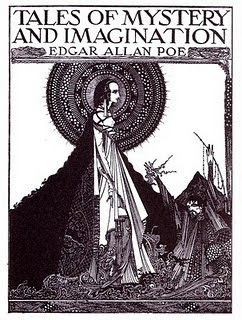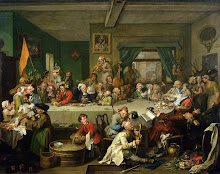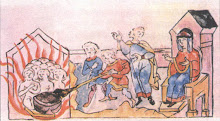I haven't the slightest idea. And neither do you. All of the usual suspects--delirium tremens, rabies (you'd think they'd figure Poe was rabid enough already,) brain tumor, syphilis, meningitis, tuberculosis, accidental poisoning, suicide, or (pace John Evangelist Walsh) a beating at the hands of robbers/emissaries of scorned women/crazed would-be brothers-in-law (take your pick)--are, for various reasons, uncertain or unconvincing. And while the "cooping" scenario has a certain Poesque quality that I'm sure would have delighted him, I think it's safe to put that one out of the running altogether. One can understand how good old George W. Eveleth came to the conclusion that the story we're told of Poe's demise was so nonsensical, it could not have happened at all.
It is an ironic blow to history that most of our information about Poe's death comes from Dr. John J. Moran, the resident physician of the hospital where the poet breathed his last. From the very start, Dr. Moran (I keep having the urge to type "Dr. Moron," but that would not be kind) evidently told different versions of the end of his most famous patient to different people. His descriptions took on increasingly baroque details as time went on, to the point that, by the time he published a booklet about Poe and hit the lecture circuit, the good doctor had made himself a public laughingstock. A letter he wrote to Maria Clemm in November 1849 has been used as the basis of all theorizing about Poe's last days. However, Moran was so unreliable (and, as even this early letter shows,) so intoxicated by the reflected glory he felt he gained from being a part of Poe's tragic end, that I would not trust him if he stated that rain was wet.
 The nineteenth-century Poe biographer Eugene Didier claimed that Poe's attending physician was a Dr. William M. Cullen (or Cullan,) not Moran, and that Dr. Cullen flatly contradicted everything Moran said about the poet's end. Michael Powell, a modern-day researcher into Poe's death, was also of the opinion that Moran never knew anything first-hand about the poet's demise. Moran's letter to Mrs. Clemm might be said to bear all this out. He gives no cause of death, stating only, "presuming you are already aware of the malady of which Mr. Poe died..." This could be interpreted as implying Moran wasn't sure himself what "the malady" was. He claimed the details he gave about Poe's death came from "the record of his case"--a record no one else from that day to this has ever seen. His reliance on this possibly mythical "record" again argues against Moran having any personal knowledge about Poe. Moran's claim that Poe's last words were "Lord help my poor soul," sounds like someone quoting the final speech of the lead villain in a third-rate Victorian stage melodrama. And the part about Poe spending his last night calling repeatedly for "one Reynolds" is simply lunatic. (It's interesting that Moran afterwards dropped that part altogether.) And, of course, all the details Moran provided Mrs. Clemm found themselves, shall we say, "evolving" over time, which implies that the doctor never had a solid account of Poe's death to begin with. I see no reason to trust Moran's first story any more than his millionth.
The nineteenth-century Poe biographer Eugene Didier claimed that Poe's attending physician was a Dr. William M. Cullen (or Cullan,) not Moran, and that Dr. Cullen flatly contradicted everything Moran said about the poet's end. Michael Powell, a modern-day researcher into Poe's death, was also of the opinion that Moran never knew anything first-hand about the poet's demise. Moran's letter to Mrs. Clemm might be said to bear all this out. He gives no cause of death, stating only, "presuming you are already aware of the malady of which Mr. Poe died..." This could be interpreted as implying Moran wasn't sure himself what "the malady" was. He claimed the details he gave about Poe's death came from "the record of his case"--a record no one else from that day to this has ever seen. His reliance on this possibly mythical "record" again argues against Moran having any personal knowledge about Poe. Moran's claim that Poe's last words were "Lord help my poor soul," sounds like someone quoting the final speech of the lead villain in a third-rate Victorian stage melodrama. And the part about Poe spending his last night calling repeatedly for "one Reynolds" is simply lunatic. (It's interesting that Moran afterwards dropped that part altogether.) And, of course, all the details Moran provided Mrs. Clemm found themselves, shall we say, "evolving" over time, which implies that the doctor never had a solid account of Poe's death to begin with. I see no reason to trust Moran's first story any more than his millionth.Where does all this leave us? Truly, in the Valley of Unrest. We know that, from at least the mid-1830s on, Poe suffered from periodic attacks of incapacitating illness--his "bad spells" as Mrs. Clemm reputedly called them--possibly accentuated or precipitated by depression, that became increasingly acute during the particularly stressful period right before and following Virginia's death. Periods of delirium were said to have set in. Losing Virginia, who was more of a mental and emotional support than possibly even he realized, did nothing to help his condition. Poe clearly deteriorated emotionally, although the oft-expressed theory that he was going mad is debatable. On the one hand, if the letters he allegedly sent Sarah Helen Whitman and "Annie" Richmond are geniune, increasing insanity is the only way to explain those singularly revolting epistles. On the other hand, his published work remained as precise and controlled as ever. It is hard to picture a crazed madman writing "Annabel Lee," "The Bells," or "Eureka." It is yet another unanswerable mystery.
These "bad spells" were often clearly not alcohol-related, although whatever drinking he did obviously must have exacerbated the problem. Blaming his death on drink alone seems far too simplistic. It is logical that, at some point after he left Richmond, he came down with another attack of his malady--whether or not he had been drinking at the time was possibly almost irrelevant--and left to what I suspect was (Moran's suspiciously defensive words to the contrary) the indifferent care of hospital workers, the combination of emotional stress, exhaustion, and possible starvation and dehydration finished him off. I'm convinced he did not have much of a will to live at this point, and it would not have taken a lot to end his existence. It was said that Mrs. Clemm always maintained that if she had only been able to nurse Poe herself, she could have pulled him through the episode as she had so often done before. That may have been true.
Marie Louise Shew Houghton told John Ingram that a doctor of her acquaintance had diagnosed Poe as having a "brain lesion," and heart trouble, which she knew would send him to an early grave. None of this is substantiated--certainly not by the doctor she named--and at the time she was writing to Ingram, Mrs. Houghton--who died soon afterwards--was not at all well herself. Her letters to Ingram are so strange, wild, and at times downright hallucinatory, they are patently the work of someone who tragically was losing--or had already completely lost--whatever wits she had once possessed. Her hysterical ravings can, at times, be downright frightening to read, and it is a sad indication of Ingram's desperate need for source material that he made biographical use of the few semi-coherent things she wrote. She may have been telling the truth. She may have been telling a complete fantasy. Either way, her statements do little to explain his known symptoms.
So...back we go to Square One: What was this episodic, increasingly debilitating condition? Where was he during those "lost days" between the time he left Richmond late in September, only to be found half-dead in a Baltimore tavern nearly a week later? No one has found the answer. I see no way anyone ever will. And I'm certain the old boy himself would have it no other way.

















No comments:
Post a Comment